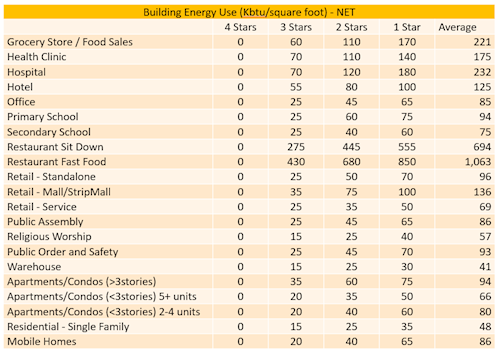

In 2020 we recognized Climate Champions in seven categories:
Plus there was an “Other” category if efforts did not fit into one of our seven main categories.
Recognition was based on an organization's performance over 12 months (we accepted January-December 2019 or a more recent 12 month period if that was more convenient).
Each of the award categories is described below.
Additional award guidelines are here.
This Climate Champions category recognizes buildings that use less energy per square foot than a typical building. (This metric, energy use per square foot, is often called energy use intensity or EUI.) Because different kinds of buildings have different levels of energy use intensity, we base the recognition level on the type of building. To earn 4 stars a building must be net zero energy while a building that is at least 25% more efficient than typical building of that type can earn 1 star. The chart below provides energy use intensity data for various building types.

Note that this category is net building energy usage, which means that if a facility has on-site solar, the calculation takes that into account, reducing the total electric consumption. This category does not recognize Renewable Energy Credits (RECs) or Carbon Offsets (you can claim credit for those efforts in the Net Emissions category).
To compete in this category you need to provide:
The application was set up to apply for recognition of one building at a time.
If your organization owns one or more vehicles, you can get recognition for having a clean energy fleet. Right now the typical fleet is 100% gas and diesel. We want to recognize entities converting to electricity, renewable natural gas (RNG) and biodiesel because all of those options reduce emissions.

For these awards we are defining clean energy vehicles to include:
To apply for the Fleet category you had to provide the total number of vehicles in your fleet and the number of clean energy fuel vehicles by type.
Organizations can have a big role in influencing how their employees get to and from work. At present in Dane County about 73% of people drive alone to work.
In this category we have two ways to earn recognition. We are recognizing entities that have successfully encouraged employees to shift to cleaner commuting options AND we are recognizing entities that are making it easier for their employees to shift to clean and active modes of transit. The chart details the two ways you can earn recognition in this category.

Here we are measuring the typical way an employee commutes. Acceptable alternatives to driving alone include:
Entities also earn credit for offering amenities that encourage fewer single-occupancy vehicle miles. Entities indicate if they:
*If your organization started allowing employees to telecommute during COVID-19 and you intend to continue that practice after the pandemic ends, you can consider this amenity met.
To apply for the Employee Commuting category an entity had to report on the number of employees and their commuting patterns as well as the amenities offered to employees.
Sustainably managing water resources is critical in mitigating and adapting climate change impacts: Moving water around Dane County and treating it requires a lot of energy, and protecting it as a basic right for all residents is a top priority. Entities are recognized in this category by completing two or more sustainable water actions.

Sustainable water actions are:
Water is something that all people, all businesses touch in some way, and therefore everyone plays a role and has a responsibility to conserve it, protect it, and reflect the value of it in their actions.
To apply for recognition in this category an entity had to report whether or not it does each of the activities listed above.
We recognized farmers and land owners for climate-friendly practices associated with both dairy and crop farming. Our focus in 2020 is on dairy operations that are transferring manure to digesters (which has a substantial impact on methane emissions as well as groundwater) and on croplands that are converted to continuous cover crops or grasslands.

As is the case with other categories, we expect the practices recognized in this category to expand over time. If you have ideas for additional practices we should recognize, please email us.
We encourage all kinds of entities to think about their total greenhouse gas emissions. And we want to recognize entities that are making progress reducing their total greenhouse gas emissions.
For this category we again compare entities to peer organizations. To do that we use the Cool Carbon Network business calculator. When you enter basic information about your organization into the calculator it generates a ‘typical’ emission profile and enables you to compare your specifics--energy usage, fleet, employee commuting, supplies--against that typical.
In this category we’ll recognize entities that have lower emissions than their peers, either based on the Cool Climate Calculator or based on other sustainability reporting.

The Cool Carbon tools are the most peer-reviewed carbon calculators in the US. Essentially a business can enter its location, kind of business (e.g., bakery or insurance company), annual revenues and number of employees to see a ‘typical’ carbon footprint for that business. That becomes the custom benchmark for that business.
If your organization purchases renewable energy credits (RECs) or carbon offsets you will be able to document that in the calculator.
It is possible that your organization has achieved significant climate success in an area not covered by the six categories listed above. If that’s the case we invite you to describe what you’ve accomplished here.
In your description be sure to include:
The deadline for submitting an application is Monday, November 9 at 5 pm. (Deadline was extended!)
The Office of Energy & Climate Change will review all submitted applications and notify applicants of their status by mid-November. We anticipate announcing the champions in early December.
The Office of Energy & Climate Change may contact applicants to verify data submitted. In some cases we might ask applicants to supply documentation for the data submitted.
Climate Champions will receive official recognition for their efforts, including signage they can post in their facility. We will also recognize Climate Champions on a map of successes in Dane County.
Entities that are out of compliance with Dane County regulations may be ineligible to receive the Climate Champion designation.
If you have questions, email oecc@danecounty.gov.